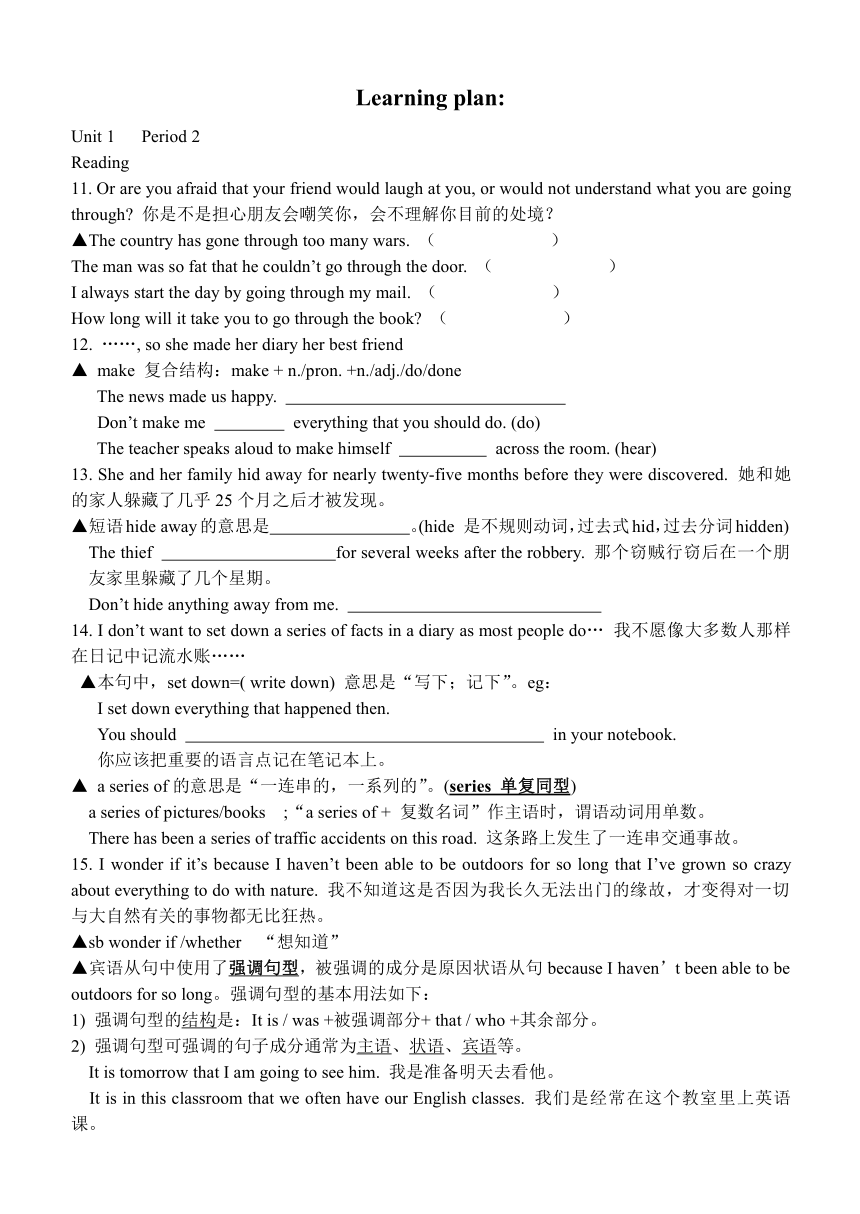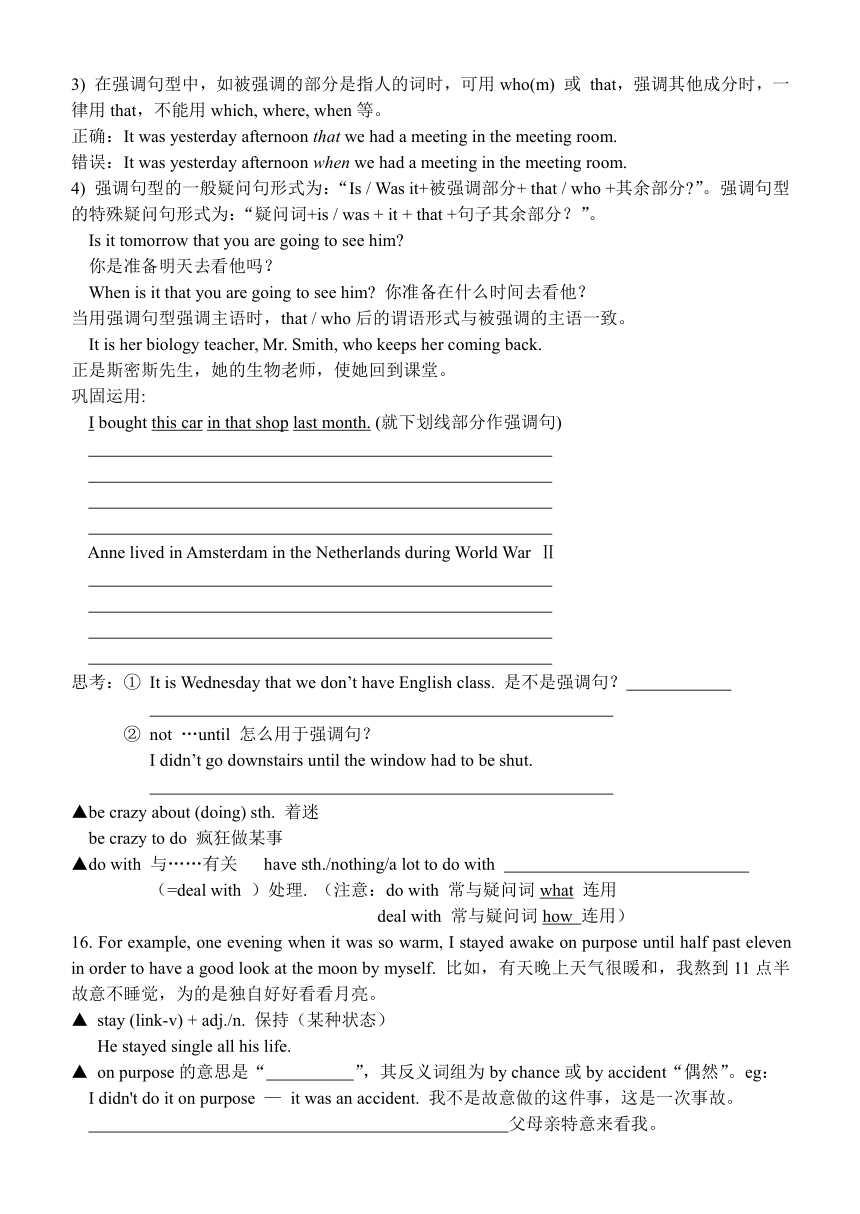Unit 1 Friendship 学案(reading)
文档属性
| 名称 | Unit 1 Friendship 学案(reading) |

|
|
| 格式 | rar | ||
| 文件大小 | 9.3KB | ||
| 资源类型 | 教案 | ||
| 版本资源 | 人教版(新课程标准) | ||
| 科目 | 英语 | ||
| 更新时间 | 2009-09-21 00:00:00 | ||
图片预览


文档简介
Learning plan:
Unit 1 Period 2
Reading
11. Or are you afraid that your friend would laugh at you, or would not understand what you are going through 你是不是担心朋友会嘲笑你,会不理解你目前的处境?
▲The country has gone through too many wars. ( )
The man was so fat that he couldn’t go through the door. ( )
I always start the day by going through my mail. ( )
How long will it take you to go through the book ( )
12. ……, so she made her diary her best friend
▲ make 复合结构:make + n./pron. +n./adj./do/done
The news made us happy.
Don’t make me everything that you should do. (do)
The teacher speaks aloud to make himself across the room. (hear)
13. She and her family hid away for nearly twenty-five months before they were discovered. 她和她的家人躲藏了几乎25个月之后才被发现。
▲短语hide away的意思是 。(hide 是不规则动词,过去式hid,过去分词hidden)
The thief for several weeks after the robbery. 那个窃贼行窃后在一个朋友家里躲藏了几个星期。
Don’t hide anything away from me.
14. I don’t want to set down a series of facts in a diary as most people do… 我不愿像大多数人那样在日记中记流水账……
▲本句中,set down=( write down) 意思是“写下;记下”。eg:
I set down everything that happened then.
You should in your notebook.
你应该把重要的语言点记在笔记本上。
▲ a series of的意思是“一连串的,一系列的”。(series 单复同型)
a series of pictures/books ;“a series of + 复数名词”作主语时,谓语动词用单数。
There has been a series of traffic accidents on this road. 这条路上发生了一连串交通事故。
15. I wonder if it’s because I haven’t been able to be outdoors for so long that I’ve grown so crazy about everything to do with nature. 我不知道这是否因为我长久无法出门的缘故,才变得对一切与大自然有关的事物都无比狂热。
▲sb wonder if /whether “想知道”
▲宾语从句中使用了强调句型,被强调的成分是原因状语从句because I haven’t been able to be outdoors for so long。强调句型的基本用法如下:
1) 强调句型的结构是:It is / was +被强调部分+ that / who +其余部分。
2) 强调句型可强调的句子成分通常为主语、状语、宾语等。
It is tomorrow that I am going to see him. 我是准备明天去看他。
It is in this classroom that we often have our English classes. 我们是经常在这个教室里上英语课。
3) 在强调句型中,如被强调的部分是指人的词时,可用who(m) 或 that,强调其他成分时,一律用that,不能用which, where, when等。
正确:It was yesterday afternoon that we had a meeting in the meeting room.
错误:It was yesterday afternoon when we had a meeting in the meeting room.
4) 强调句型的一般疑问句形式为:“Is / Was it+被强调部分+ that / who +其余部分 ”。强调句型的特殊疑问句形式为:“疑问词+is / was + it + that +句子其余部分?”。
Is it tomorrow that you are going to see him
你是准备明天去看他吗?
When is it that you are going to see him 你准备在什么时间去看他?
当用强调句型强调主语时,that / who后的谓语形式与被强调的主语一致。
It is her biology teacher, Mr. Smith, who keeps her coming back.
正是斯密斯先生,她的生物老师,使她回到课堂。
巩固运用:
I bought this car in that shop last month. (就下划线部分作强调句)
Anne lived in Amsterdam in the Netherlands during World War Ⅱ
思考:① It is Wednesday that we don’t have English class. 是不是强调句?
② not …until 怎么用于强调句?
I didn’t go downstairs until the window had to be shut.
▲be crazy about (doing) sth. 着迷
be crazy to do 疯狂做某事
▲do with 与……有关 have sth./nothing/a lot to do with
(=deal with )处理. (注意:do with 常与疑问词what 连用
deal with 常与疑问词how 连用)
16. For example, one evening when it was so warm, I stayed awake on purpose until half past eleven in order to have a good look at the moon by myself. 比如,有天晚上天气很暖和,我熬到11点半故意不睡觉,为的是独自好好看看月亮。
▲ stay (link-v) + adj./n. 保持(某种状态)
He stayed single all his life.
▲ on purpose的意思是“ ”,其反义词组为by chance或by accident“偶然”。eg:
I didn't do it on purpose — it was an accident. 我不是故意做的这件事,这是一次事故。
父母亲特意来看我。
do sth. with /for the purpose of …… 出于……目的;为了……
▲in order to(=so as to)意思是“目的是;为的是”。但是 so as to 不能放在句首。否定结构为:in order not to;so as not to
He came home early in order to see the children before they went to bed. 为了在孩子们睡觉之前看看他们,他回家很早。
I agreed to her suggestion in order not to upset her. 我同意她的建议为的是不让她难过。
为了听清楚老师的讲课,请保持安静。
17. But as the moon gave far too much light, I didn’t dare open a window. 但是因为月光实在太亮了,我不敢开窗户。
▲本句中的too much修饰不可数名词light,意思是“太”、“过于”。far 常用在形容词或副词前加强语气。如:
He spends far too much time on video games. 他在计算机游戏上花的时间实在太多了。
The new system is far better than the old one. 这套新系统要比旧系统好多了。
▲ 本句中,dare与open之间省略了不定式符号to。此句中dare是实义动词,意思是“敢;胆敢”。dare用作实义动词时,后接带to的动词不定式,但是在口语中,dare可以与不带to的不定式连用。如:
I don’t dare to tell her the truth.
= I dare not tell her the truth.
我不敢告诉他真相。
He didn’t dare (to) say what he thought.
他不敢说出他的想法。
15. Another time some months ago, I happened to be upstairs at dusk when the window was open. 还有一次,就在五个月前的一个晚上,我碰巧在楼上,窗户是开着的。
(=Another time some months ago, it happened that I was upstairs one evening when the window was open.)
▲句中happen的意思是“碰巧”。happen 作“碰巧”解时,常见结构为:
1) happen to do something碰巧做……;偶然做……
You don’t happen to know his name, do you
你会不会碰巧知道他的名字?
2) happen to be doing something 碰巧在做……
When I went to visit him, he happened to be going out.
= When I went to visit him, it happened that he was going out.
我们去看他时,他碰巧正要出去。
3) happen to have done碰巧做过……
She happened to have heard the news.
(= It happened that she had heard the news.)
她碰巧听到了这个消息。
4) It (so) happens that…碰巧……
It just so happens that I have her phone number right here.
真是无巧不成书, 我这里正好有她的电话号码。
Fortunately it happened (that) there was no one in the house at the time of the explosion.
幸运的是爆炸发生时房子里碰巧没人。
▲“It is / was the + first (second, third, last) + time + that +主语+完成时”是固定句型,该句型表示“是第几次做…”,it也可以换成this或that。主句用现在或将来时态时,that从句中通常用现在完成时态;主句用过去时态时,that从句中多用过去完成时。
This is the first time (that) I have been to Beijing.(= It is the first time (that) I am in Beijing.)这是我第一次来北京。
That was the third time that he had been to Canada. 那是他第三次去加拿大。
17. It’s no pleasure looking through these any longer because nature is one thing that really must be experienced. 观看这些已经不再是乐趣,因为大自然是必须亲身体验的。
▲本句中,it是形式主语,looking through …是真正主语。类似结构:
It’s no use talking with him. He is too stubborn. 跟他谈也没用。他太固执了。
It’s no good eating too much before going to bed. 睡觉前吃得太多没有好处。
Unit 1 Period 2
Reading
11. Or are you afraid that your friend would laugh at you, or would not understand what you are going through 你是不是担心朋友会嘲笑你,会不理解你目前的处境?
▲The country has gone through too many wars. ( )
The man was so fat that he couldn’t go through the door. ( )
I always start the day by going through my mail. ( )
How long will it take you to go through the book ( )
12. ……, so she made her diary her best friend
▲ make 复合结构:make + n./pron. +n./adj./do/done
The news made us happy.
Don’t make me everything that you should do. (do)
The teacher speaks aloud to make himself across the room. (hear)
13. She and her family hid away for nearly twenty-five months before they were discovered. 她和她的家人躲藏了几乎25个月之后才被发现。
▲短语hide away的意思是 。(hide 是不规则动词,过去式hid,过去分词hidden)
The thief for several weeks after the robbery. 那个窃贼行窃后在一个朋友家里躲藏了几个星期。
Don’t hide anything away from me.
14. I don’t want to set down a series of facts in a diary as most people do… 我不愿像大多数人那样在日记中记流水账……
▲本句中,set down=( write down) 意思是“写下;记下”。eg:
I set down everything that happened then.
You should in your notebook.
你应该把重要的语言点记在笔记本上。
▲ a series of的意思是“一连串的,一系列的”。(series 单复同型)
a series of pictures/books ;“a series of + 复数名词”作主语时,谓语动词用单数。
There has been a series of traffic accidents on this road. 这条路上发生了一连串交通事故。
15. I wonder if it’s because I haven’t been able to be outdoors for so long that I’ve grown so crazy about everything to do with nature. 我不知道这是否因为我长久无法出门的缘故,才变得对一切与大自然有关的事物都无比狂热。
▲sb wonder if /whether “想知道”
▲宾语从句中使用了强调句型,被强调的成分是原因状语从句because I haven’t been able to be outdoors for so long。强调句型的基本用法如下:
1) 强调句型的结构是:It is / was +被强调部分+ that / who +其余部分。
2) 强调句型可强调的句子成分通常为主语、状语、宾语等。
It is tomorrow that I am going to see him. 我是准备明天去看他。
It is in this classroom that we often have our English classes. 我们是经常在这个教室里上英语课。
3) 在强调句型中,如被强调的部分是指人的词时,可用who(m) 或 that,强调其他成分时,一律用that,不能用which, where, when等。
正确:It was yesterday afternoon that we had a meeting in the meeting room.
错误:It was yesterday afternoon when we had a meeting in the meeting room.
4) 强调句型的一般疑问句形式为:“Is / Was it+被强调部分+ that / who +其余部分 ”。强调句型的特殊疑问句形式为:“疑问词+is / was + it + that +句子其余部分?”。
Is it tomorrow that you are going to see him
你是准备明天去看他吗?
When is it that you are going to see him 你准备在什么时间去看他?
当用强调句型强调主语时,that / who后的谓语形式与被强调的主语一致。
It is her biology teacher, Mr. Smith, who keeps her coming back.
正是斯密斯先生,她的生物老师,使她回到课堂。
巩固运用:
I bought this car in that shop last month. (就下划线部分作强调句)
Anne lived in Amsterdam in the Netherlands during World War Ⅱ
思考:① It is Wednesday that we don’t have English class. 是不是强调句?
② not …until 怎么用于强调句?
I didn’t go downstairs until the window had to be shut.
▲be crazy about (doing) sth. 着迷
be crazy to do 疯狂做某事
▲do with 与……有关 have sth./nothing/a lot to do with
(=deal with )处理. (注意:do with 常与疑问词what 连用
deal with 常与疑问词how 连用)
16. For example, one evening when it was so warm, I stayed awake on purpose until half past eleven in order to have a good look at the moon by myself. 比如,有天晚上天气很暖和,我熬到11点半故意不睡觉,为的是独自好好看看月亮。
▲ stay (link-v) + adj./n. 保持(某种状态)
He stayed single all his life.
▲ on purpose的意思是“ ”,其反义词组为by chance或by accident“偶然”。eg:
I didn't do it on purpose — it was an accident. 我不是故意做的这件事,这是一次事故。
父母亲特意来看我。
do sth. with /for the purpose of …… 出于……目的;为了……
▲in order to(=so as to)意思是“目的是;为的是”。但是 so as to 不能放在句首。否定结构为:in order not to;so as not to
He came home early in order to see the children before they went to bed. 为了在孩子们睡觉之前看看他们,他回家很早。
I agreed to her suggestion in order not to upset her. 我同意她的建议为的是不让她难过。
为了听清楚老师的讲课,请保持安静。
17. But as the moon gave far too much light, I didn’t dare open a window. 但是因为月光实在太亮了,我不敢开窗户。
▲本句中的too much修饰不可数名词light,意思是“太”、“过于”。far 常用在形容词或副词前加强语气。如:
He spends far too much time on video games. 他在计算机游戏上花的时间实在太多了。
The new system is far better than the old one. 这套新系统要比旧系统好多了。
▲ 本句中,dare与open之间省略了不定式符号to。此句中dare是实义动词,意思是“敢;胆敢”。dare用作实义动词时,后接带to的动词不定式,但是在口语中,dare可以与不带to的不定式连用。如:
I don’t dare to tell her the truth.
= I dare not tell her the truth.
我不敢告诉他真相。
He didn’t dare (to) say what he thought.
他不敢说出他的想法。
15. Another time some months ago, I happened to be upstairs at dusk when the window was open. 还有一次,就在五个月前的一个晚上,我碰巧在楼上,窗户是开着的。
(=Another time some months ago, it happened that I was upstairs one evening when the window was open.)
▲句中happen的意思是“碰巧”。happen 作“碰巧”解时,常见结构为:
1) happen to do something碰巧做……;偶然做……
You don’t happen to know his name, do you
你会不会碰巧知道他的名字?
2) happen to be doing something 碰巧在做……
When I went to visit him, he happened to be going out.
= When I went to visit him, it happened that he was going out.
我们去看他时,他碰巧正要出去。
3) happen to have done碰巧做过……
She happened to have heard the news.
(= It happened that she had heard the news.)
她碰巧听到了这个消息。
4) It (so) happens that…碰巧……
It just so happens that I have her phone number right here.
真是无巧不成书, 我这里正好有她的电话号码。
Fortunately it happened (that) there was no one in the house at the time of the explosion.
幸运的是爆炸发生时房子里碰巧没人。
▲“It is / was the + first (second, third, last) + time + that +主语+完成时”是固定句型,该句型表示“是第几次做…”,it也可以换成this或that。主句用现在或将来时态时,that从句中通常用现在完成时态;主句用过去时态时,that从句中多用过去完成时。
This is the first time (that) I have been to Beijing.(= It is the first time (that) I am in Beijing.)这是我第一次来北京。
That was the third time that he had been to Canada. 那是他第三次去加拿大。
17. It’s no pleasure looking through these any longer because nature is one thing that really must be experienced. 观看这些已经不再是乐趣,因为大自然是必须亲身体验的。
▲本句中,it是形式主语,looking through …是真正主语。类似结构:
It’s no use talking with him. He is too stubborn. 跟他谈也没用。他太固执了。
It’s no good eating too much before going to bed. 睡觉前吃得太多没有好处。
